Maverick Life
Diane Wilson at 80: The life and times of a veteran of the boards
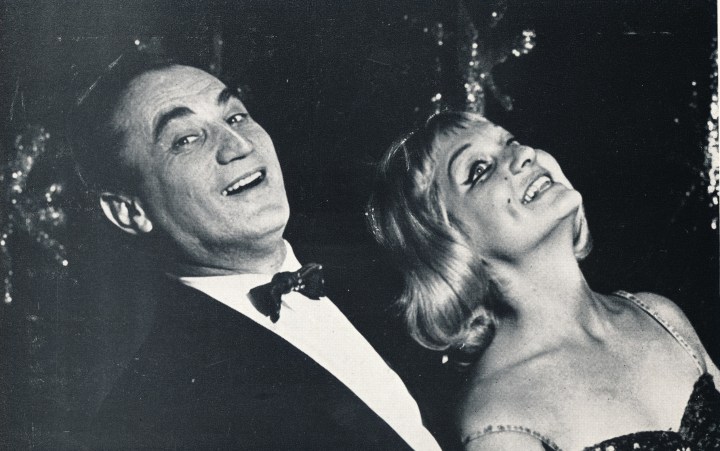
A walk through the seven-decade (and counting) career of one of South Africa’s most celebrated and deeply experienced thespians, the actress Diane Wilson.
When somebody says, well, I started out young and I always knew that this was what I wanted to do, it’s usually a fairly meaningless generalisation. But when veteran actress Diane Wilson says it, it rings true and bold. In fact, what she says is this: “I was a war baby born in 1941. My father and mother conceived me in 1940 and he immediately left to join the war. My mother had to work so I started school as a boarder at Durban Girls College at the age of four. I moved as a boarder to Maris Stella Convent where Joan Brickhill was my drama mistress. She told me that I was a born actress so naturally I believed her and decided at the age of nine that that was what I was going to do.”
And there’s serendipity right there. A born actress, and who should your school drama mistress be but Joan Brickhill, grande dame of the South African stage. But that was all a lifetime ago. Diane Wilson, who was named after the song Diane, the theme song from the 1927 silent movie Seventh Heaven (later a smash hit for Irish vocal harmony group The Bachelors in the Sixties), has just turned 80, and Maverick Life approached her for an interview to mark this milestone.
Wilson is known for her strength of character and presence; she has a sternly no-nonsense way about her, suffers not one fool, speaks her mind readily. So I was expecting her to be guarded while proffering strong opinions at will. Yet, right at the off, there’s this: “Joan Brickhill was the first person with whom I fell in love. I was obsessed with her.”
Later, she shares a photo of herself as Puck at the age of 10, wearing the exact costume that Brickhill herself had worn when she played Puck at the same age. It is not her only memento.
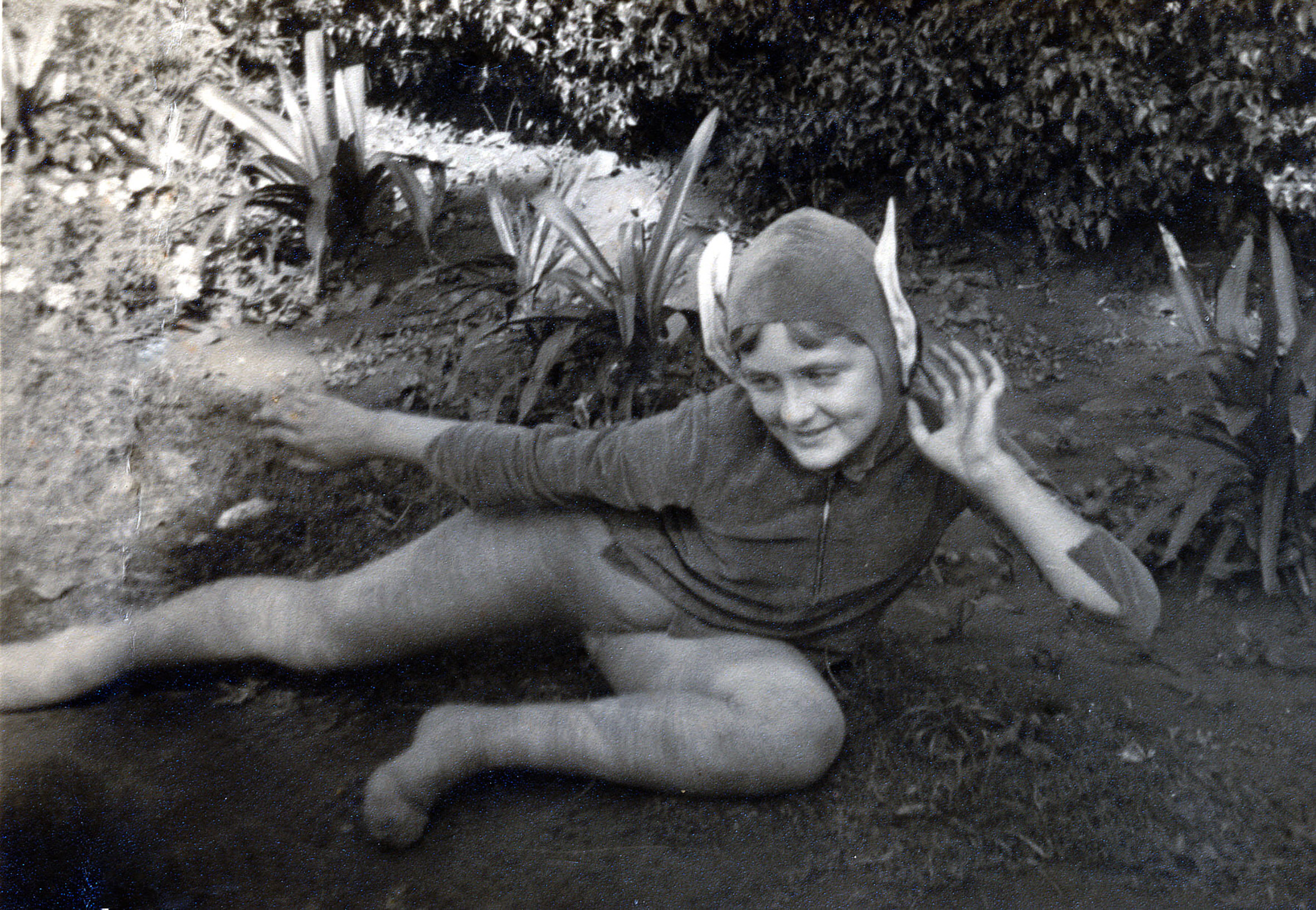
Wilson, at the age of 10, in the Puck costume that her drama mistress Joan Brickhill had worn when she herself played Puck at the age of 10. (Photo: Supplied)
“Whilst applying our makeup backstage for her production of A Midsummer Night’s Dream, she [Brickhill] removed her false bun made from her own hair and forgot it on the table. I stole it and treasured it until our next meeting, taking it to bed with me every night in the dormitory and using it like a Teddy bear.”
There was a Mrs Worthington in the young Wilson’s background. “My mother was a stage mother and pushed me in every sphere of the acting profession. In March 1956 when she saw that Brian Brooke was looking for students of 16 and over to join his company, she told me to lie about my age (I had just turned 15 the month before) and sent me off to audition. I was supposed to be an assistant stage manager as well as an actress but, almost immediately, I was put into leads in plays like Affairs of State and The Reluctant Debutante.
“The Brooke Company left the Hofmeyr Theatre at the end of 1956 and Brooke decided to settle his company at the Brooke Theatre in De Villiers Street, Johannesburg. My mother decided that I needed further education and managed to persuade Professor Elizabeth Sneddon to accept me into Natal University for English and Drama. I was barely there six months when Brian Brooke offered me another contract to tour the country with The Reluctant Debutante and Separate Tables. So I left TS Eliot and Aristophanes for William Douglas Home and Terence Rattigan.”
So, still sweet 16, she repeated these plays and performances for Leonard Schach Productions, which had taken over the Hofmeyr Theatre. There followed a long tour of Sandy Wilson’s production of The Boy Friend, in which she played Faye, “one of the four perfect young ladies”. The musical had been a smash London West End and Broadway hit and marked Julie Andrews’ stage debut in the US. “We went all over the country and [the then] Rhodesia.” She adds, “I celebrated my 17th birthday on that tour.”
The following year saw her parents packing her off to London, which was to prove a seeding ground for the young star’s growing independence. They had given her “£200 to last me. When it ran out I was to come home.”
While still in Durban, Wilson had met the Pretoria-born British actress Glynis Johns, who would appear in the film of Mary Poppins as Sister Suffragette a few years later. Johns put her in touch with “her big deal agent Al Parker, who got me the most amazing accommodation on the 9th floor of the block where he lived: 55 Park Lane.
“The 9th floor was rooms for secretaries and housekeepers, and his lived out, so for £2 a month I lived in a room that overlooked the Oliver Messel Suite of The Dorchester hotel.”
This was (and is) the famous suite decorated by and named in honour of the lauded stage designer and artist, an exotically decked suite of rooms which today offers butler service, a deck with a view of the London skyline and a welcome bottle of Krug Grande Cuvée, for the modest minimum daily rate of £3,630.
When not admiring her view, Wilson was working on two BBC television plays, A Mask for Alexis, and The Girl on the Switchboard, “both of which were broadcast live (and I started them both with the countdown)” and “a few bits and pieces of C grade movies”.
After spending her 19th birthday at York Rep company she decided to return to South Africa in the spring of 1960. We must wonder where her career would have taken her had she remained in the UK. Certainly, in South Africa it was to take her to the heights of local acclaim.
At 80, she remembers this about the teenage Diane Wilson’s return: “Thanks to my Catholic upbringing, I was still a virgin when I returned after a year in London and remained so until the age of 20 when eventually I begged a visiting actor to take my virginity as I was so sick of being so ignorant. When the penny dropped as to what the process entailed, I begged him to stop right there as I had changed my mind. I didn’t realise how awful it was going to be.”
It was to be stage director and producer Leonard Schach who would play a huge role in establishing Wilson’s career back home. “He cast me in superb parts, including opposite Dame Flora Robson on a long tour of The Corn is Green where I celebrated my 21st birthday in 1962.”
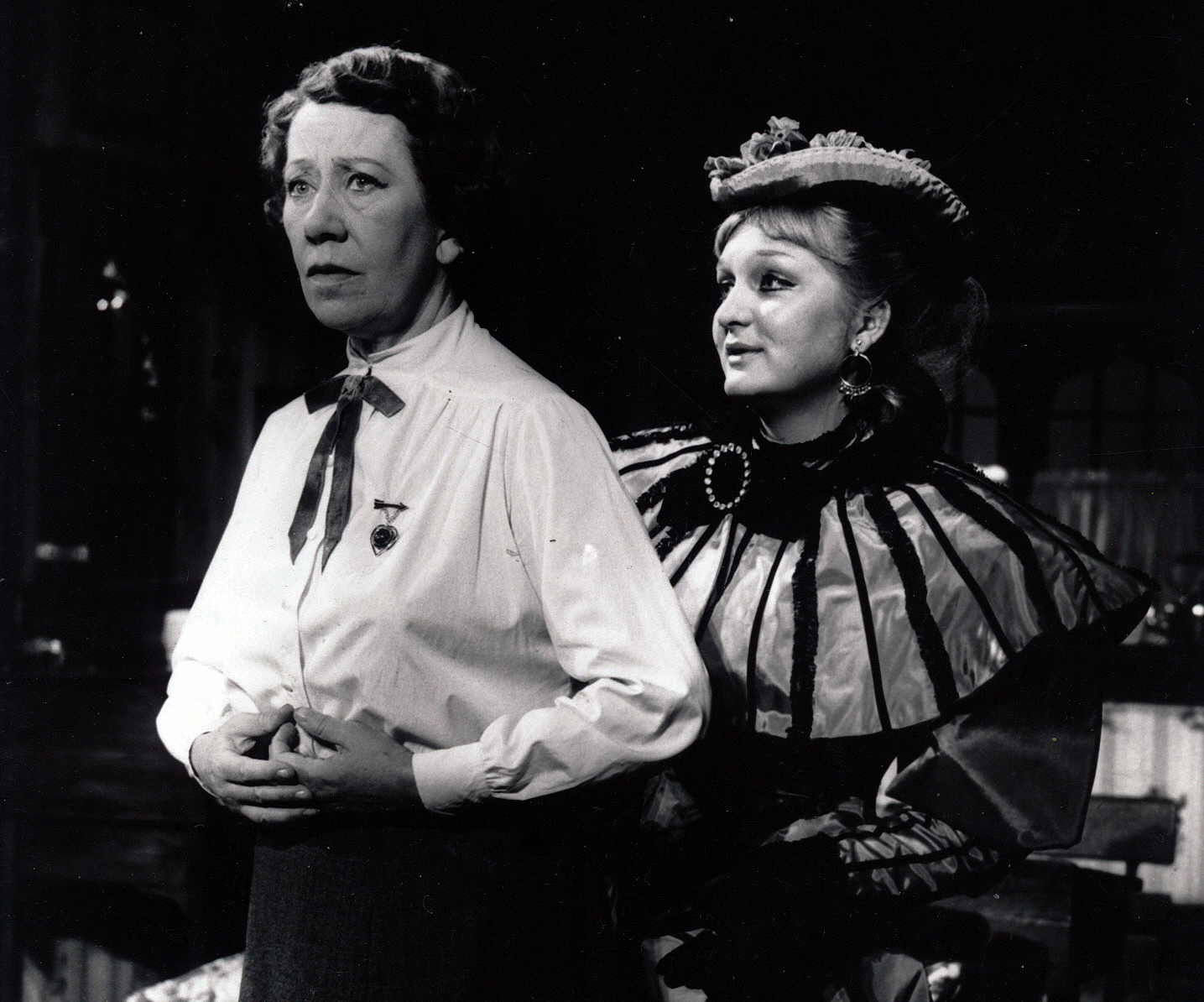
Dame Flora Robson and Diane Wilson in ‘The Corn is Green’. (Photo: Supplied)
Playing opposite Brook Williams (son of the Welsh dramatist Emlyn), the second act ended with Brook throwing her on a sofa and jumping on top of her as the curtain came down.
“In Act 3, I have had his baby. So Act 2 ended but the curtain (operated from the gods in the old Playhouse theatre in Braamfontein) did not come down. The operator, it seems, had gone off for a smoke. So now Brook and I were left to improvise sexual congress. Someone pushed the button for the fire curtain which operated very, very, very slowly…”
Her roles for Schach included Lulu in Harold Pinter’s The Birthday Party, “another gem”, and she played opposite a host of actors including Nigel Hawthorne and Siegfried Mynhardt, “whom I worshipped”.
“After Leonard, I became Adam Leslie’s leading lady in a box office mega hit called Adam’s Rib followed by Adam’s Apple, with Cy Sacks.
“Adam treated me like a queen, buying me clothes and gifts and making me sleep stretched out behind him in the station wagon we toured in. He was a great socialite and I would be taken as his partner to visit all these very grand people in whichever city or town we were in. So many delicious meals in so many top restaurants.”
“One night, friends of Michael Mayer told him that the rape looked choreographed so, without consulting me, he decided to make some changes for the next performance which resulted in my falling badly from the bed and breaking my ankle.”
In 1963 Wilson married Gordon Mulholland, 20 years her senior and already well established as an actor, though his career would explode in the decade to follow through his television role in The Villagers. In 1963 the now wedded couple transplanted their marriage to the stage, as it were, playing husband and wife in Noël Coward’s Blithe Spirit and Peter Schaffer’s plays The Private Eye and The Public Ear.
“Television did not arrive for actors until 1977, so we were radio actors and very successful too. I had a permanent parking bay in the garage opposite the SABC in Commissioner Street where I worked every day and two nights a week with audience participation shows like The Castle Laugh-In and Plascon Calls the Tune and Nice Work down the road at Michael Silver’s CRC studios where we also did shows like The Creaking Door and Inspector Carr Investigates and Consider your Verdict and and and…”
Back in those halcyon days of Springbok Radio, it was customary for visiting stars to be invited to guest in radio plays, and one day Diane found herself working opposite Marlene Dietrich. The radio work was so prolific that in both 1967 and 1969 she “went directly from radio studios to the maternity wards”.
The marriage to Mulholland was not to last.
“Shortly after the birth of my sons, I did a successful four-hander comedy for Toerien, Firth and Rubin at the Intimate Theatre. It had an imported director, Patrick Tucker, and two terrific imported actors in James Bolam and Peter Blythe. My dear friend Gillian Garlick and I made up the rest of the cast. It was a real love fest (platonic) and was called So What About Love? Gordon was unhappy about this and started to feel very insecure.
“After my divorce from Gordon in 1972, I worked for Adam Leslie again in revue in his theatre in Doornfontein. and then was fortunate enough to be invited to join PACT [Performing Arts Council of the Transvaal] in 1974.”
Joining a theatre company is no small thing in an actor’s career, so joining PACT was “heaven for an actor”, as Wilson puts it, “doing only plays of great literary merit”.
While at PACT, Ken Leach was the resident director “and we all respected him enormously”. One production stands out for unfortunate reasons. “The Happiness Cage directed by Ken Leach sticks in my mind because I had a rape scene opposite Michael Mayer which had been very carefully choreographed since it involved a lot of jumping and falling and running from and off a high hospital bed.
“One night, friends of Michael Mayer told him that the rape looked choreographed so, without consulting me, he decided to make some changes for the next performance which resulted in my falling badly from the bed and breaking my ankle. Lynne Marais, the stage manager, had to take over from me. I was furious of course but that’s showbiz.”
And here, on cue, is the feisty Diane Wilson…
“My dismissal from PACT was interesting. We rehearsed all day and performed each night. Eight shows a week; two on Friday and two on Saturday. The English plays played three weeks at the Alexander Theatre in Braamfontein and two weeks at the Breytenbach in Pretoria. The opposite for the Afrikaans plays. During the August of the third year I was with PACT, my seven-year-old son Jamie became very ill. I had a useless doctor who told me he had flu but I realised it was worse and asked for a pediatrician.
“Darling Dorothy [Ann] Gould drove me in my car to Rissik Street to see the specialist while her husband Ian Steadman drove their car so that I could be left with my son and my car to return to the theatre after the doctor. To cut a long story, my son had encephalitis and had to be taken immediately to hospital. Gordon, his father, was on tour. I phoned our company manager, Jannie Swanepoel, from the doctor’s rooms to tell him I would not make the show in Pretoria that night.
“ ‘When will you be back?’ ” he asked.
“ ‘When my son is better,’ ” I replied.
“Lesley Nott took over from me in 24 hours and played the rest of the run. I was back for the start of rehearsals for the next play. This was August. October at Pact was “Briefie Dag” which meant all the actors and crew got a briefie (letter) to tell them if their contracts had been renewed or not. My briefie read as follows:
Dear Diane,
Thank you for all your hard work during the last 3 years. We will not be renewing your contract because we need dedicated actors in our company. Enjoy next year with your children.
Signed
Louis van Niekerk
“When I confronted Louis van Niekerk about this years later, he denied having written it. I have a feeling the letter was dictated by Francois Swart. He was vindictive enough to do it and his favourite sport was blackballing actors who displeased him. I was the only actor in our company with children.”
But nobody puts Diane Wilson in a corner. Hence…
“However, 1977 without PACT was fine. I did a lot of radio work and many radio commercials and a revue for [satirist] Robert Kirby called How Now Sacred Cow at the Market Theatre. At the start of 1978, I did a wonderful Aldous Huxley play for television called The Gioconda Smile, which won me the Artes [award] for best television performance.”
One might hope that her nemeses at PACT were looking on when the next turn in her career materialised.
“Later on in the year was the real prize. Pieter Fourie from Capab , who had seen me in Death of a Salesman at PACT, wanted me to repeat my performance for Capab [the then Cape performing arts council] opposite Michael Atkinson and directed by Roy Sargeant. He also offered me Miss Lucy in Tennessee Williams’ Sweet Bird of Youth, directed by Henry Goodman.”
Her “darling” Leonard Schach then cast her in a Baxter production for the Company of Four (a celebrated Cape theatre company of the day), The Price by Arthur Miller, whom she calls “an actor’s dream; dialogue to die for”.
Fourie then offered her a contract with Capab which, like that at PACT, was renewable yearly. “I felt fairly secure when Capab paid for me to bring all my possessions from Johannesburg to Cape Town. That contract lasted from 1978 until Capab was disbanded in 1997.”
One highlight of many during the Capab years was Shirley Valentine, the Willy Russell delight, and what a plum role for any actress keen to fill the stage, solo. If you don’t count Wall.
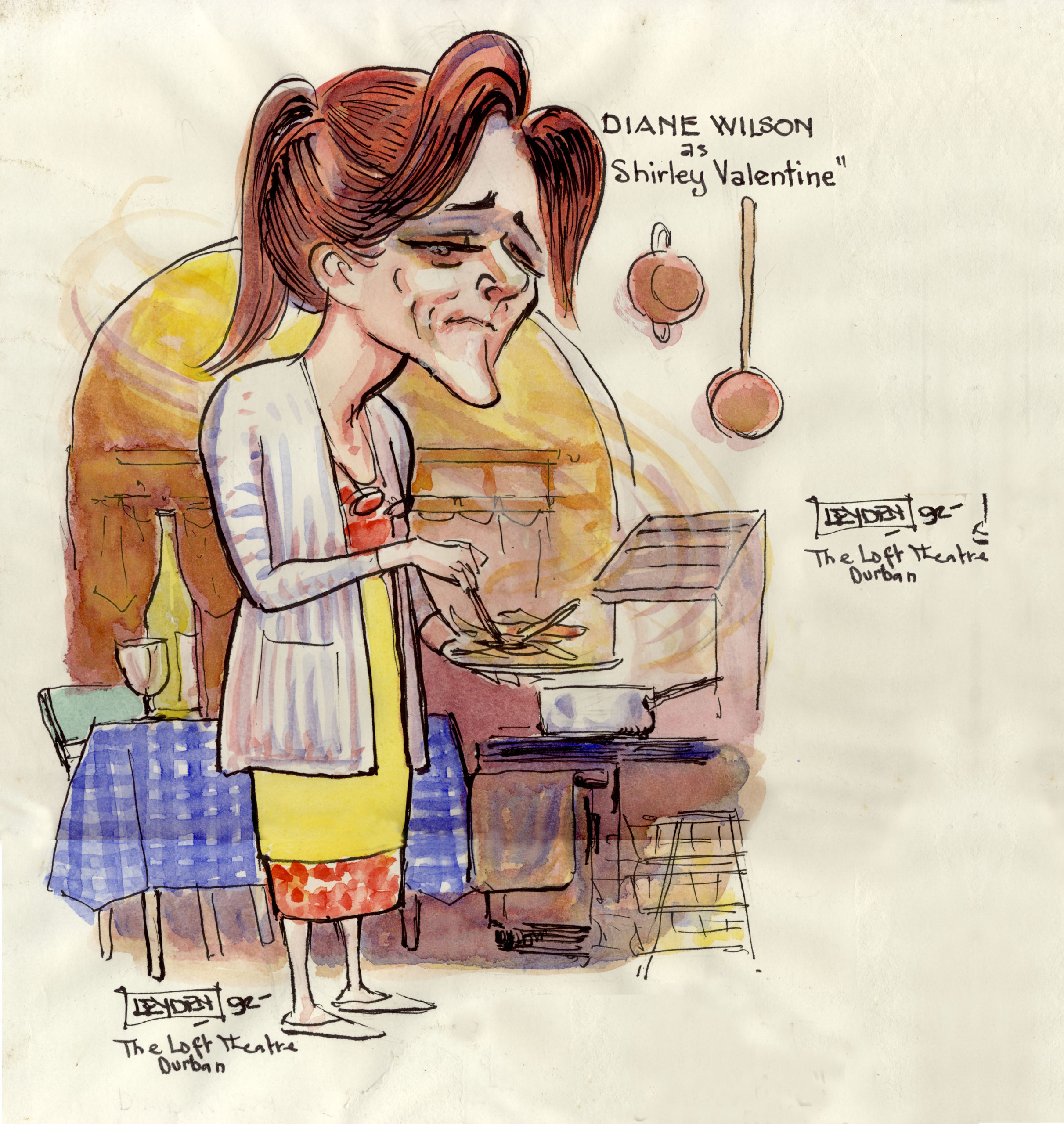
Cartoonist Leyden’s sketch of Diane Wilson as Shirley Valentine in the eponymous play when it played in Durban. (Image supplied)
“The most successful one-woman play I have done was Shirley Valentine. Murray McGibbon from Napac [the former Natal arts council] had been after me to do it but it made me nervous …”. There had been an earlier production which, she says, had been “a dreadful flop”.
“I said to Murray, ‘If you think I am learning 60 pages of monologue to play to nobody, you must be out of your mind.’ Anyway, he eventually persuaded me to do it and came to an arrangement with Capab to release me for it. It played forever to rave reviews and won me awards in every province of the country that we played, including the Vita national awards.”
Like everything in life, Capab itself was to prove transitory as the political winds blew south. And here is feisty Wilson again, pondering the shutting of the institution.
“Some members of Capab fought like hell to keep it. It was such a shame to be disbanded just when we had such a brilliant and diverse company with each racial group well represented. All those meetings with Angelo Gobbato, Marthinus Basson, Veronica Paeper, Blaise Koch and myself with representatives from the ANC… We pleaded and fought and fought and pleaded, to no avail.
“After we all became freelance again, some good work was still there. Roy Sargeant had taken over as head of drama at the Baxter after the wonderful John Slemon, whom everyone adored and respected. One of my most prized letters was one John Slemon wrote me in praise of a performance of mine. Zelda was a co-production of Capab and the Baxter, arranged by my mentor Basil Rubin. Directed brilliantly by Michael Atkinson, it was my first one-person play of any consequence. An experience I will always treasure. Other productions of merit at the Baxter were Roy Sargeant’s direction of Kindertransport, still my husband Alistair’s favourite production in all the years we have been together.”
For all the great imported plays Wilson has worked in, one of her favourites of all was by a South African playwright whose end was ultimately tragic.
“While Roy ran the Baxter, Fiona Coyne wrote Glass Roots, one of the most successful local plays ever written. We were a main festival event at the Grahamstown Festival and returned with it the following year and played to packed houses again. Fiona based the lead character (mine) on her mother, who was a fascinating woman with many flaws. Fiona had obtained a degree in psychology and wanted to do her masters, which involved being analysed by her examiners. She was apparently asked to tell the examiner about her mother and was so overcome that she could not stop crying. The examiner then told her that before attempting her masters she had to sort out her relationship with her mother. So she wrote Glass Roots, one of my favourite parts ever.
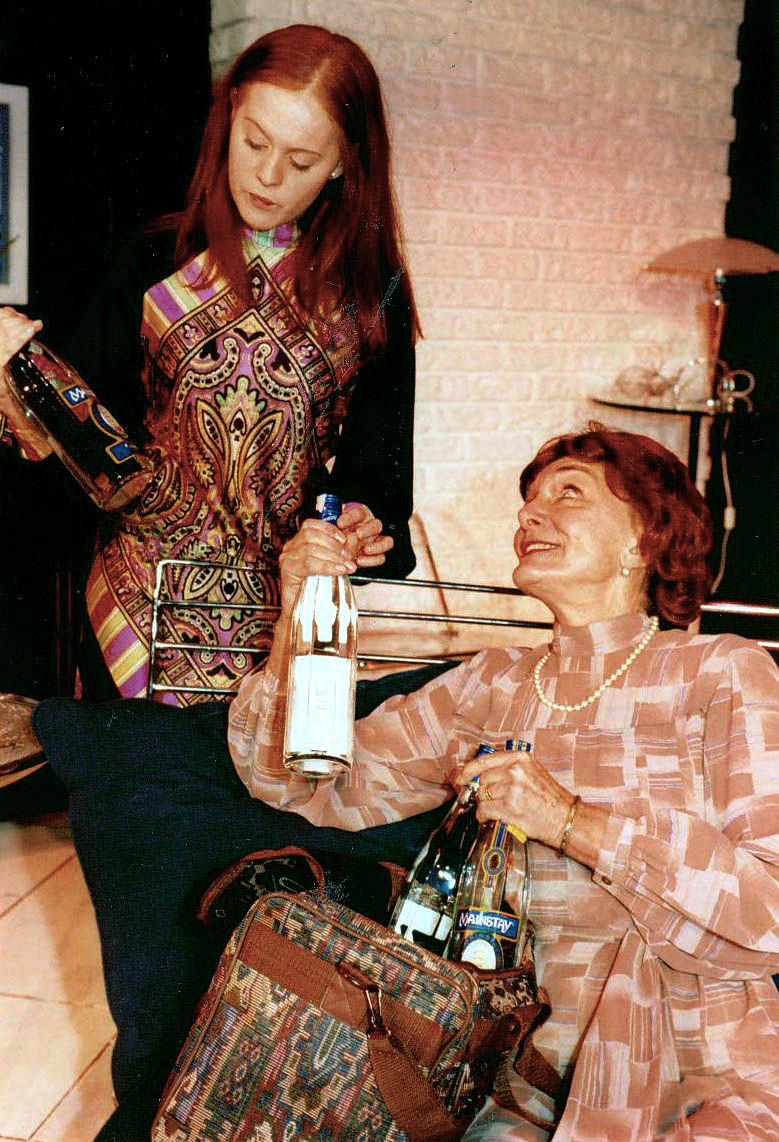
Wilson with Jenny Stead in Fiona Coyne’s ‘Glass Roots’. (Photo: Supplied)
“She later wrote Careful for me and her best friend Deirdre Wolhuter, which travelled to Dublin for Brian Merriman’s gay festival and once again was a huge hit. Fiona was a hugely talented but troubled soul and her suicide was an enormous loss to our business.”
Casting around for new work, Wilson reached a decision.
“Around this time I realised that as a freelancer, one had to create one’s own work. The obvious way to do that was to get together a one-person play that was portable with as few props and furniture as possible. I was looking for someone whose copyright had run out so as to avoid expensive rights having to be paid. I decided that Virginia Woolf was the ideal person. She was an icon, was witty and clever and wonderfully psychologically complicated. All the things that made her challenging and fascinating for an actor.
“I could not type in those days so I sat copying out all my favourite passages and stories from her letters and diaries in long hand. This took me just a few days as I was in a fever of excitement. I then phoned Roy Sargeant and told him that I had written a script for him to evaluate.”
“ ‘Send it to me,’ ” pronounced Sargeant.
“I replied that I would have to read it to him because my handwriting was illegible. So he gave me an appointment at his house in Marina Da Gama and I drove there to read it to him. He liked it, said I must get it typed, which Fiona Coyne did for me for the price of a Chinese meal.
“Apropos speaking my mind, I decided at the start of my career that I was going to live a life of truth if I was to be a truthful actress. I never lie and as a result am considered brutal by some.”
“Roy then decided that I could perform it at the Baxter studio during the UCT summer school in January. I was thrilled. Roy directed it himself, absolutely brilliantly. The relationship between an actor and a director can be very special and mine with Roy Sargeant was always inspiring, always wonderful. Conversations with Virginia Woolf kept me going for years at festivals and libraries and universities and colleges and art centres in South Africa and in the USA.”
I had asked the grand lady for her own take on the view many have of her of being forthright, perhaps too much so on occasion. She was not shy to reply.
“Apropos speaking my mind, I decided at the start of my career that I was going to live a life of truth if I was to be a truthful actress. I never lie and as a result am considered brutal by some.”
I also asked her about corpsing, the term for an actor losing control or being unable to contain their mirth. Wilson is having none of it.
“You ask about corpsing. I do not approve. I find it unprofessional and unforgivable. An actor, in order to be successful, needs great powers of concentration and commitment. My worst are ‘planned corpses’, so beloved of farces and revues. I hate them and consider them dishonest and embarrassing. I won’t do it.”
Professionals she has worked with would agree. The playwright Geraldine Aron said this when asked to contribute to this piece: “Having Diane in the cast almost always guarantees a play’s success. I was lucky enough to have her in five of mine and I can hear her delivery of certain lines in my head to this day. Perhaps my favourite was The Spare Room, in which she played four very different characters – each a masterclass in acting, wonderfully nuanced.
“Her comic timing is sublime, her tragic roles break your heart and – a bonus! – even the back row of the stalls hears her every syllable. And she’s always a hundred percent faithful to the script. A great actress, truly a gift to any playwright.”
And, it turns out, one blessed with long life. On being 80, she says: “I am grateful that I still have my health and a perfect husband for me in Alistair. We have been together nearly 41 years and he is my rock. My sons are my passion and have always been more important to me than my career.”
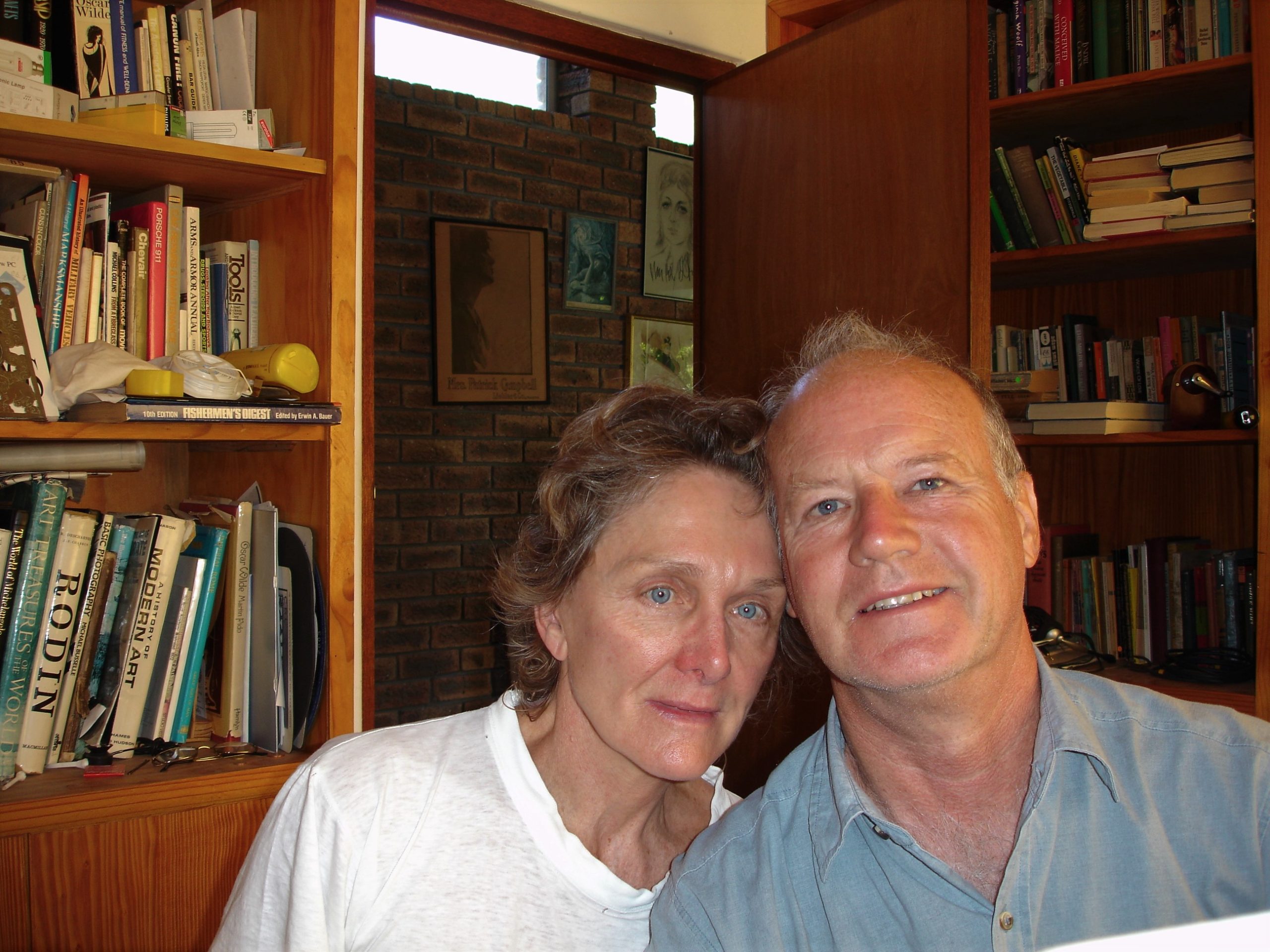
Diane Wilson and her husband Alistair Yuill in their study in Cape Town. (Photo: Supplied)
On death? “I am a devout atheist, so do not believe in the afterlife or any of those other superstitions. When I climbed off the agnostic fence and admitted atheism, my mind became free and happy without all that nonsense that was drummed into me as a child. I went from Roman Catholic to agnostic to atheist, which I see as an excellent progression.”
The most recent role on her CV was that of Mrs Strakosh in Funny Girl at the Fugard in Cape Town in 2017, but there is no reason to presume that her career is over. “I adored the music,” she says of that show, “I adored the cast and I adored Charl-Johan Lingenfelder and Matthew Wild for thinking of me at my age. I have always loved musicals, and musicians and writers are the artists I admire most of all.”
Her own show, I suspect, is not over yet. DM/ML




















 Become an Insider
Become an Insider
What a wonderful lady and also to have the intellect in escaping religion. Respect.
Thank you for this profile – so many things I didn’t know about Diane’s story. Being on stage with her kept you always on your toes. It was always stimulating and often hilarious (without corpsing!). And if things went sideways she could paralyse an actor at 5 paces with just one look. Looking forward to the next play Diane..